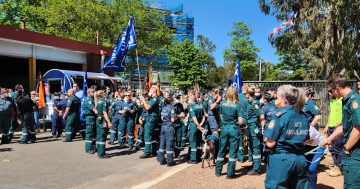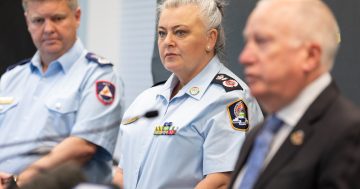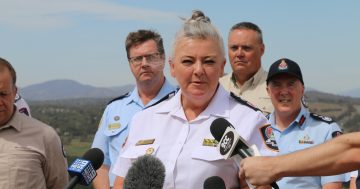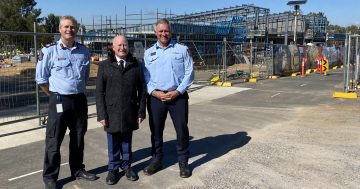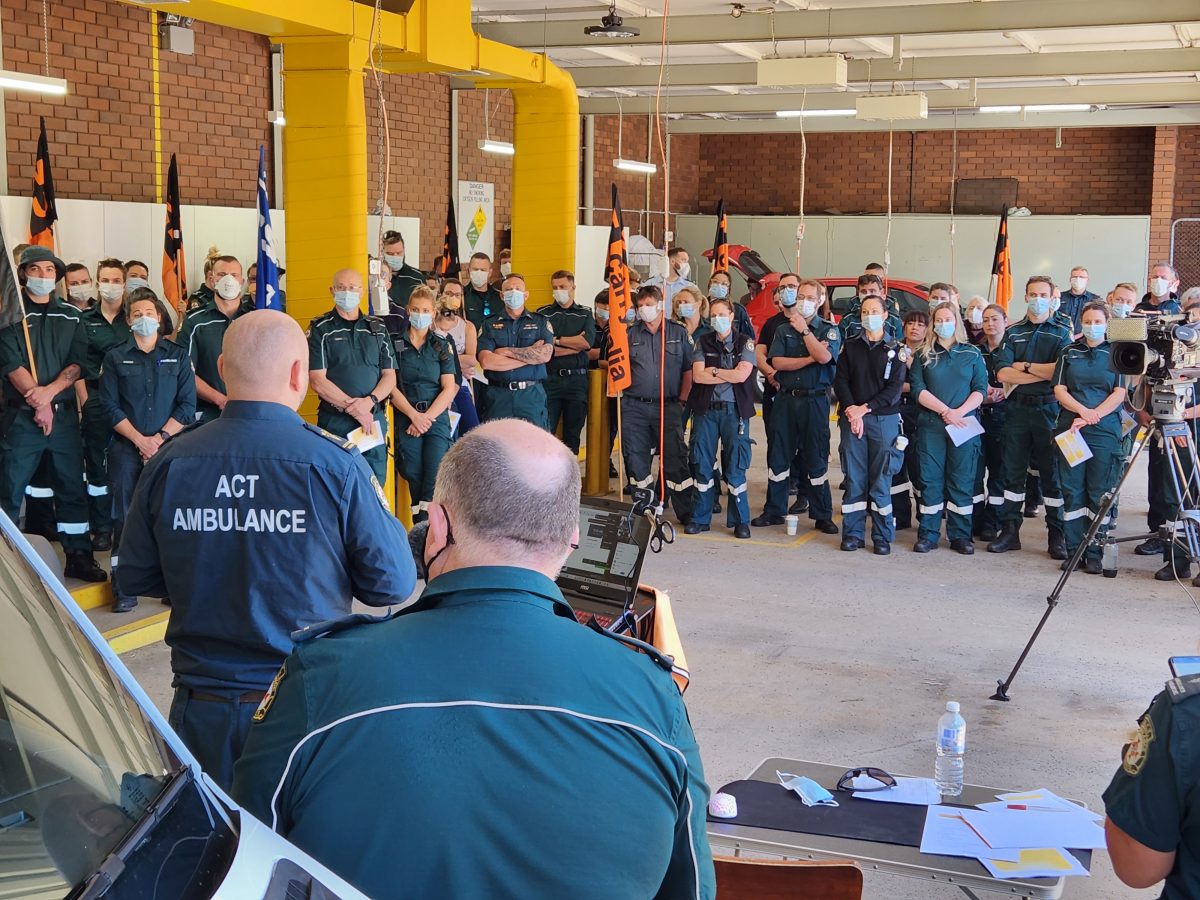
ACTAS union members previously held strike action over working conditions and faith in the ESA Commissioner in November last year. Photo: Transport Workers’ Union.
Paramedics have yet again expressed zero confidence in Emergency Services Agency (ESA) Commissioner Georgeina Whelan as their union caucus begins to investigate how to separate the ACT Ambulance Service (ACTAS) from the organisation.
It’s the second no-confidence motion regarding the Commissioner that has been passed in the past six months.
Transport Workers Union (TWU) Ambulance Caucus secretary Jim Arneman said it was due both to lack of and slow progress on a number of key items that paramedics had been asking for.
One in particular was the initiation of a 44-hour roster for emergency operations. Currently paramedics work two 14-hour night shifts and two 10-hour day shifts over four days, then have four days off.
It was promised this would be changed to two day shifts, one afternoon shift and one 10-hour night shift over four days. It was originally promised to begin in July, 2022, and then November.
“The Commissioner hasn’t been actively engaging with us on these things,” Mr Arneman said.
“Quite frankly [the ESA and government] have been dragging their feet.”
Paramedics took industrial action in November last year to publicise the roster issue.
It’s now been promised this new roster will begin February 2024, with 30 paramedics already funded and accounted for in the current budget. However Mr Arneman said an extra 30 were still needed to cover the new roster.
“It’s the forward resourcing for the roster that will be our next battle I’m sure,” he said.
Issues have also been raised about Commissioner Whelan’s conduct during meetings with the paramedics’ union representatives.
Mr Arneman said joint workshops with the Commissioner had broken down “very quickly” after she took on the role, and described instances where it was felt she had been “quite disparaging” towards delegates.
“The stuff we were seeing would have landed us in all types of trouble [conduct-wise],” he said.
There was also a feeling the Commissioner had “overpromised and under-delivered” on a number of issues for ACTAS.
An independent review into ESA leadership is currently underway.
The union also voted for the caucus to begin investigating how ACTAS would devolve from the ESA into a standalone statutory authority.
The ESA also stands underneath the Justice and Community Safety Directorate.
Mr Arneman said the general view was they would be better off directing their own course than what was happening at the moment.
“Most sensible people are saying [the new roster] would have been done two years ago if it had just been in our hands,” he said.
“There seems to be no value add [for ACTAS] from the Directorate or ESA.”
Mr Arneman said there was a feeling among members that those in charge didn’t fully appreciate or understand the work they were doing or pressures they faced, and that if they did there would have been movement on a number of key issues much sooner.
“We’re reading it as them being disrespectful in this relationship,” he said.
“Ultimately [being separate] would mean the people who know our business best … are the ones making the decisions moving forward.
“We want to be the masters and mistresses of our own destiny.”
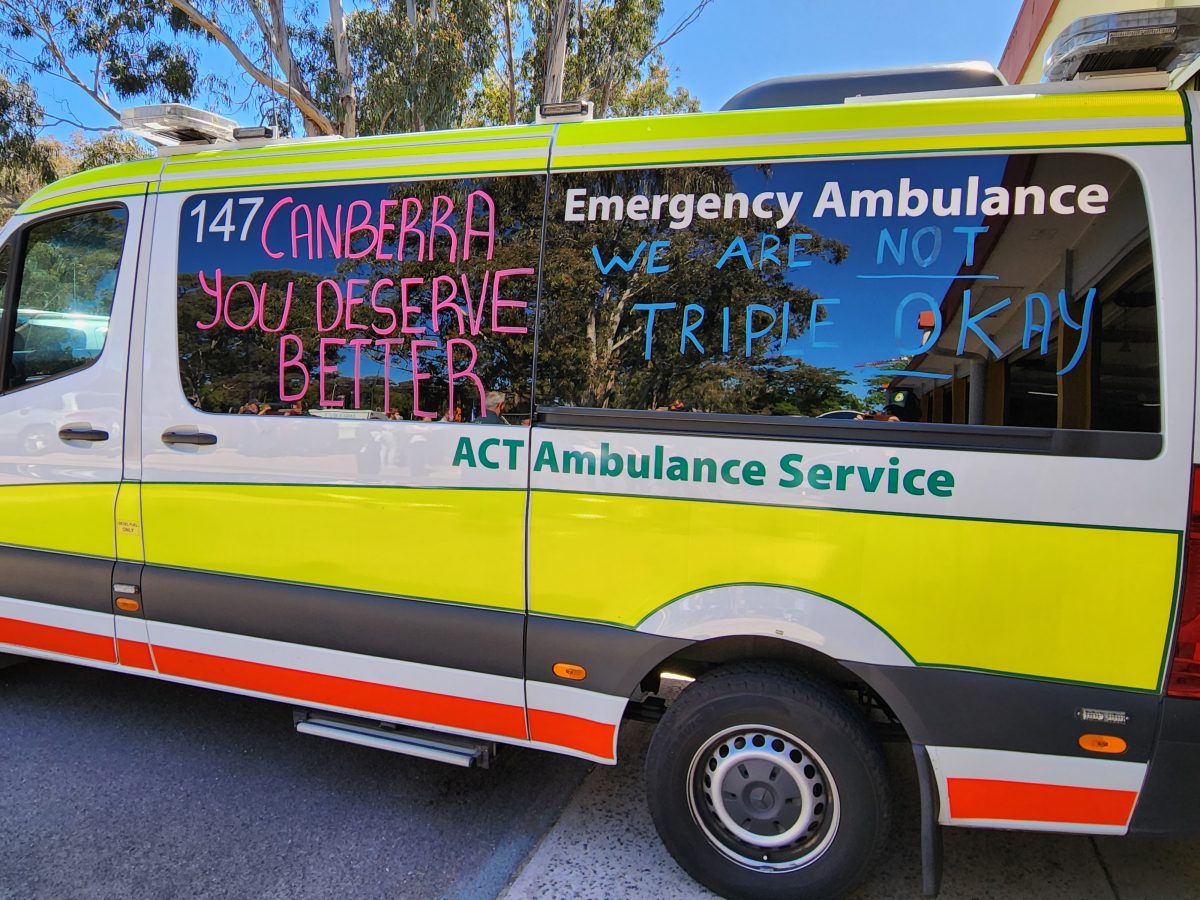
Paramedics previously ‘chalked’ their ambulances with messages as part of industrial action. Photo: Transport Workers’ Union.
Other areas of contention have been transitioning ACTAS’s communications centre and operations support back into their management line.
Both were promised last year.
The government has committed to transferring the communications centre by 7 June, but operations support is still up in the air.
Mr Arneman said they also needed a fit-for-purpose facility for ambulance call takers, who he said took more calls per year than fire and police combined.
“They’re the glue who hold our emergency response together and they’re in a sub-standard facility,” he said.
Union members also voted they could take strike action if they felt it was needed during upcoming enterprise bargaining agreement negotiations.
Emergency Services Minister Mick Gentleman said the government was proud of the current emergency services model, and that its highest priority was ensuring delivery of ambulance services were maintained to the “highest standards possible”.
He confirmed he had given in principle support for moving to the new roster when it was “safe and practicable”.
“The implementation of a new ambulance roster requires sufficient lead time to ensure adequate budget, administration, FTE, communication, and training for staff is in place,” Mr Gentleman said.
“The ACT Government and the ESA are committed to delivering a new roster and have been working diligently to move to implementation in a timely manner.”
He said a Roster Working Group and Risk Oversight Committee would be established to develop the roster and assess how many more personnel were needed to implement it safely.
“Since 2018, the ACT Ambulance Services (ACTAS) has recruited a total of 101 paramedics and has invested more than $50 million in funding,” Mr Gentleman said.
“Future staffing decisions are subject to Budget considerations.”
Mr Gentleman also reaffirmed his confidence in Commissioner Whelan.












